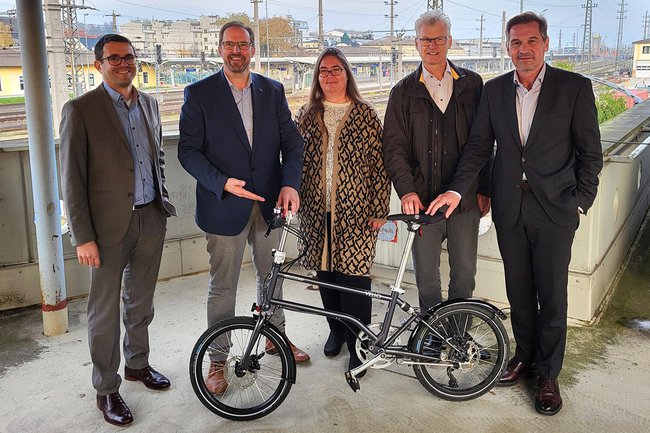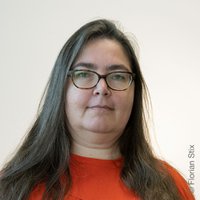Regional Mobility Lab in the Mostviertel
Promoting Sustainable Mobility Together

Together with Waidhofen an der Ybbs and Amstetten, the St. Pölten University of Applied Sciences is establishing the mobility lab “AmWy.mobility” for the region. Its purpose is to develop new and sustainable mobility concepts for rural areas. This week, the mayors and vice mayors of both towns as well as the project partners introduced the initiative to the public. Within the framework of a workshop, the project team also presented the mobility lab to citizens and business representatives.
The idea behind mobility labs is to come up with answers to challenges that arise in the context of transport and mobility. They conduct research on new technologies and practice-oriented solutions. Moreover, they engage in exchange with a wide range of interest groups and with the general public in order to address the problems from as many angles as possible. Important topics include the first and last trips in the supply chain (“first-and-last-mile logistics”), freight logistics, and active mobility.
“Reginal mobility labs in rural areas are still few and far between. These places face special challenges as their population and building density is low compared to big cities. This, in turn, affects the ‘modal split’, which refers to the distribution of the transport volume among the individual modes of transport, as smaller towns and rural regions in general have a lower share of trips that can be covered either on foot or using public transport. Regional mobility labs can help to pave the way for new and sustainable mobility concepts through networking, knowledge transfer, and the provision of data”, says Alexandra Anderluh, Senior Researcher at the Carl Ritter von Ghega Institute for Integrated Mobility Research at the St. Pölten UAS.
Collaboration across District Borders
As Waidhofen an der Ybbs and Amstetten share an important transport corridor, the mobility lab is to become active across the border between the two administrative districts. This will make it possible to develop more viable and far-reaching solutions.
“When it comes to the mobility topic, it is particularly important to think outside the box of community borders, to support one another with existing know-how, and develop new mobility options together that are fit for the future”, says Markus Brandstetter, Mayor of Amstetten.
“The axis Waidhofen-Amstetten is of great importance for the positive development of our region. I am thus particularly pleased to see our two towns work on the mobility topic together supported by the economic expertise of the St. Pölten UAS”, adds Werner Krammer, Mayor of Waidhofen.
Cooperation with Upper Austria and Establishment of Experimental Spaces
A cooperation with the Upper Austrian MobiLab2.0 is also planned in order to profit from the latter’s know-how and achieve synergies to promote the mobility transition.
The focus of the mobility lab AmWy.mobility is on personal and freight mobility in the region. In addition, a mobility database is to be established, the acquired knowledge is to be broadly communicated, and public awareness for new forms of mobility is to be raised. Both municipalities provide areas as experimental spaces where concepts for new solutions can be tested, thus rounding off the Mobility Lab’s offer.
Innovative and Participatory Approaches
Compared to larger towns in Austria, motorised individual transport is still clearly dominant in the Amstetten-Waidhofen region. Therefore, it takes innovative approaches to bring about changes, and the situation in the region’s freight transport is to be likewise improved.The project’s idea is to initiate networking activities on the mobility topic in the region. In this context, special attention is to be paid to participatory processes, that is, the involvement of all relevant stakeholder groups and the general public.
“Stakeholders and users will be brought together to collaboratively develop sustainable and innovative mobility solutions. This participatory approach makes sure that everyone involved shares in the responsibility – which, in turn, ensures changes that are borne by many”, explains Anderluh.
Partners in the project are the municipalities of Amstetten and Waidhofen an der Ybbs. Support comes from the Federal Ministry for Climate Action, Environment, Energy, Mobility, Innovation and Technology (BMK) as well as the Austrian Research Promotion Agency (FFG).

Dr. Alexandra Anderluh
Senior Researcher Carl Ritter von Ghega Institute for Integrated Mobility Research Department of Rail Technology and Mobility
Mag. Mark Hammer
Section Head PressMarketing and Communications